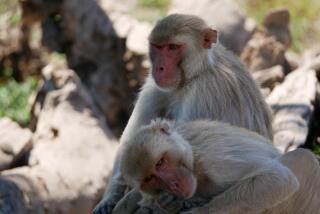Call It Animal Magnetism : Studies suggest chemistry may influence which species mate for life. But people? That’s where it gets tricky.
- Share via
Birds do it. Beetles do it. Even crocodiles and starfish-eating shrimp do it.
So why can’t Zsa Zsa, Liz and Mickey Rooney do it?
Vasopressin and oxytocin.
Since biologists first discovered a chemical basis for life, researchers have been looking for chemical explanations for behavior as well.
And, often, they found them. For example, a surge in serotonin--a brain chemical linked to violence--can make you happy all day; a serious shortage and you want to blow up the world.
Now comes a chemical theory for monogamy, which, as biologists define it, is the ritual of meeting, mating and bonding with one partner for life.
Better living through chemistry? Yes, if you are a vole.
According to this theory, vasopressin and oxytocin are linked to monogamous behavior. But while these hormones are found in humans, the notion that they cause monogamy has only been tested in this species of furry rodent.
Naturally, its application to human behavior may soon be irresistible.
“We have the first evidence of a neurochemical basis for social attachment,” announced Dr. Thomas Insel after the recent publication of his research team’s findings in the scientific journal Nature.
In studies of the tiny mouse-like voles, Insel’s team found that the male hormone vasopressin seems to lead to nurturing, fatherly behavior, a zest for mating, monogamy and cuddling.
The hormone is also found in larger mammals and despite their best efforts to limit the discussion to voles, Insel and his colleagues concede that their findings may apply to human behavior as well.
“Everyone wants to know about humans,” sighs Insel collaborator Dr. Sue Carter, “but all we can talk about, all we really know about, is voles. Still, the possible implications for humans are enticing.”
The voles of Insel’s and Carter’s research are an aggressively monogamous species of Midwest prairie vole, a cute Disneyesque creature that mates for life.
Unlike their polygamous (and vasopressin-deprived) West Coast cousins--the montane vole--prairie voles are known for their solid family values and fierce togetherness.
*
One of the earliest studies of voles began more than three decades ago. When University of Illinois ecologist Lowell Getz set traps for voles--luring them with peanut butter sandwiches--he always caught at least two. Often, the entire family came to picnic in Getz’ cage. (After a period of gentle observation, the families were released back to the wild.)
“Obviously, these voles stuck together,” says Carter who also works with Getz and expanded his early research. “We all wanted to know why.”
A University of Maryland neuroscientist with three children and a 22-year marriage, Carter became interested in the biology of attachment after her first pregnancy.
“I knew I felt something very different, a very strong attachment to my new baby,” Carter says. “Anyone who has ever had a strong sexual experience can tell you what changes that brings, as well. What I wanted to find out was what chemicals were operating behind the scenes of such events.”
To do that, Carter, Insel and the other researchers selected the prairie vole because of its special place in the animal kingdom and its special suitability for research: Voles are small and easy to handle, they only live about two years, and the vole population is sharply divided into polygamous and monogamous camps.
Only about 3% of mammals are monogamous, according to biologists. Humans are not considered monogamous, although some patterns of multiple marriage--a la Liz Taylor and Zsa Zsa--have been labeled serially monogamous.
By isolating male voles before and after mating and extracting hormone samples from their brains, the team found that lifelong devotion could be linked to the action of vasopressin.
In both male and female mammals, including humans, vasopressin is known for its role in regulating blood pressure; it is also involved in learning and memory.
But in Midwestern prairie voles, scientists found it has another dimension.
As a bachelor, the male vole is a gregarious creature who befriends males and females with equal enthusiasm. But once he mates, say researchers, the so-called monogamy hormone kicks in and life as he knows it is over.
Within 24 hours, the male vole turns indifferent to other females and aggressive toward any male in sight. Some scientists call it “the jealous husband syndrome.”
But as nasty as he is to the outside world, this newly sensitive male is cuddly and gentle at home. Indeed, one of the exciting discoveries about vasopressin, says Carter, is its apparent ability to turn young and irresponsible males into affectionate and protective fathers.
In the female voles, it is the hormone oxytocin that sparks the interest in long-term relationships. Oxytocin in women is well-known for its effects during labor and birth, triggering uterine contractions as well as the production of breast milk.
A recent study by a Swedish scientist suggests that oxytocin may be responsible for altering the personalities of new mothers as well.
“They are much calmer and more sensitive to the feelings of other people,” reported Dr. Kerstin Uvnas-Moberg, whose study found that high levels of oxytocin in women’s blood was tied to heightened sensitivity to others.
The presence of these two hormones has been used by other scientists to explain some parents’ slave-like devotion to their children. “The social implications are potentially enormous,” says Insel, “but making the jump from vole to human is dangerous.”
Whether vasopressin could be used to create sensitive “new men,” for example, is a question Insel and Carter do not address. But they are hoping their findings will trigger research into possible new roles for vasopressin in treatments for autistic children and others who have problems bonding.
But the temptation to ask is strong. “You can’t help but wonder how much of what we don’t understand about relationships might have a chemical component,” says Kate Wachs, a Chicago psychotherapist.
“As a relationship doctor, I’ve observed any number of imperfect couples,” says Wachs, “and there is no question that monogamy is a very healthy state for many people. Most people benefit from having the safety and comfort and stability a really good commitment can bring.”
And besides, “Isn’t it nice to know there’s a true chemistry to attraction?”
“The wonderful difference,” says Wachs, “is that, unlike other animals, we are not slaves to our instincts. We can mediate our behavior and make it fit the situation.”
More to Read
Sign up for Essential California
The most important California stories and recommendations in your inbox every morning.
You may occasionally receive promotional content from the Los Angeles Times.













